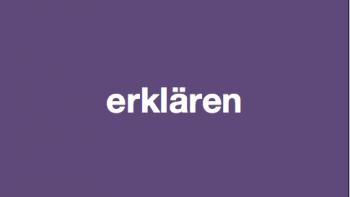Tag Archives: tenses
The German Verb ‘Sprechen’ (To Speak) Posted by Constanze on Nov 10, 2020

Guten Tag! In this ‘back to basics’ post, we’re going to look at the conjugation of the German verb sprechen – to speak. A very appropriate verb for your language learning! 🙂 Sprechen is an irregular German verb, meaning that both its endings and its stem will sometimes change. Here are a few conjugations of…
The German Verb Haben – To Have (4 Tenses) Posted by Constanze on May 20, 2020

Guten Tag! If you’re a fairly new German learner, this post will benefit you as it covers one of the basics of the language. If you’re not new to the language, it’s still a good idea to revisit the basics from time to time! Today we’re looking at the verb haben (to have) and its…
Change Of Routine (German Simple Past Tense) Posted by Constanze on Apr 15, 2020

Guten Tag! How is life looking for you lately? I think it’s true for the majority of people at the moment that routines have changed. Certain things that we used to do, we aren’t doing any more, and new habits and routines have formed in their place. In this post I’d like to show you…
German grammar in use: The conjugation of the verb “hören” Posted by Sandra Rösner on Oct 1, 2014
The German verb “hören” has got three major meanings: The ability to hear The conscious activity to listen (to) To do what an authority commands you: to obey Additionally, there are several compound verbs with the stem “-hören”, which specify HOW you hear or listen. zuhören – to listen to The verb “zuhören” is a…
German grammar in use: The conjugation of the verb “erklären” Posted by Sandra Rösner on Sep 25, 2014
The common English translation for the German verb “erklären” is to explain. Further, it can mean to declare, to state, or to define — depending on context. Below you can find some example sentences with the German verb “erklären” and its conjugations. Präsens – Present tense Singular Plural 1st person ich erkläre wir erklären 2nd…
German grammar in use: The conjugation of the verb “kommen” Posted by Sandra Rösner on Sep 8, 2014
The German verb kommen is an irregular verb. That is, there is a vowel change when you form its past. The common English translation of kommen is “to come” or “to arrive”. But kommen is also used in several phrases. Check out the example sentences below to find out how the verb kommen is used…
German grammar in use: The conjugation of the verb “machen” Posted by Sandra Rösner on Sep 1, 2014
The regular German verb machen means “to do” or “to make” in English. But machen is also used in various compounds in German, which have specific English translations. In these specific translations the English verbs “to do” and “to make” need not occur necessarily. Präsens – Present tense In German the Präsens is used to…




